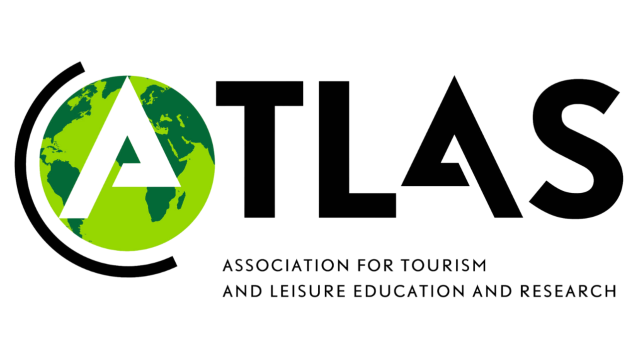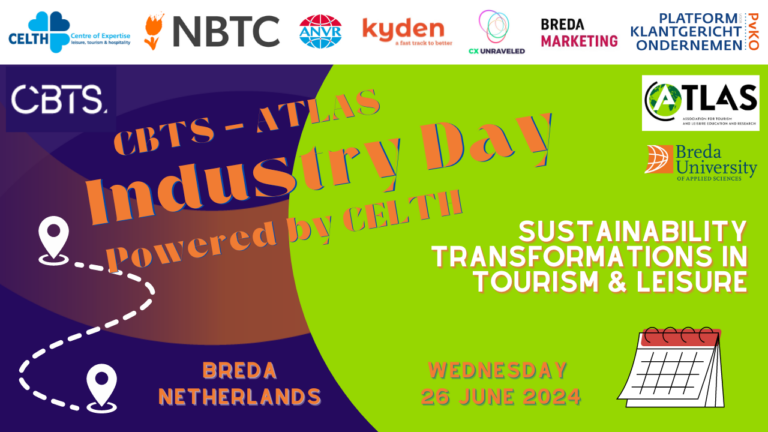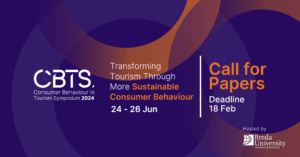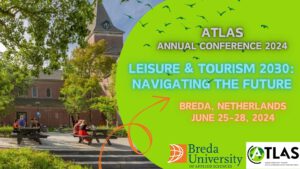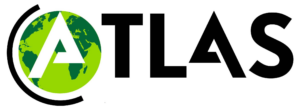ATLAS Annual Conference 2024
Leisure & Tourism 2030: Navigating the Future
Breda, Netherlands
June 25-28, 2024
Registration can be done HERE
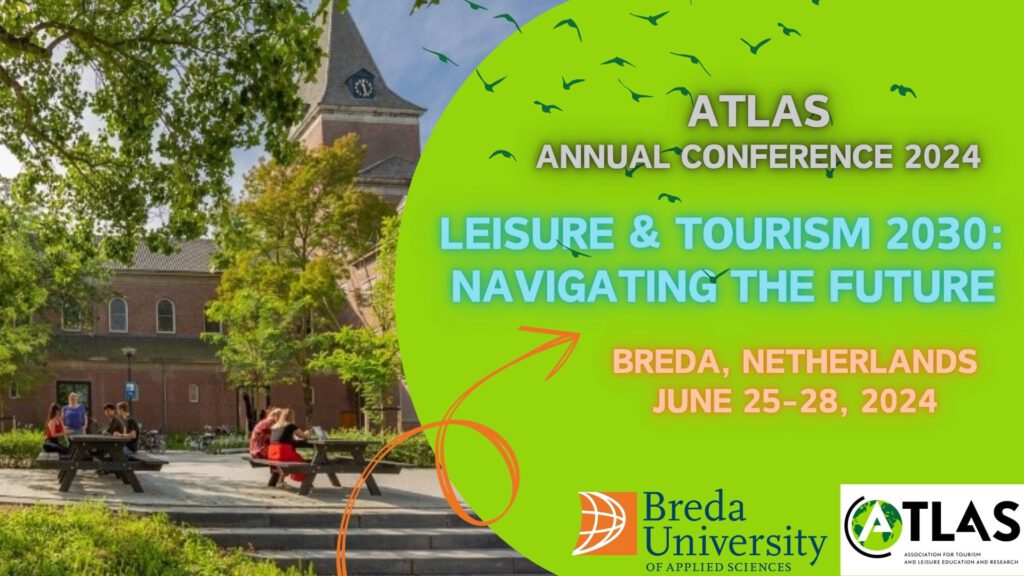
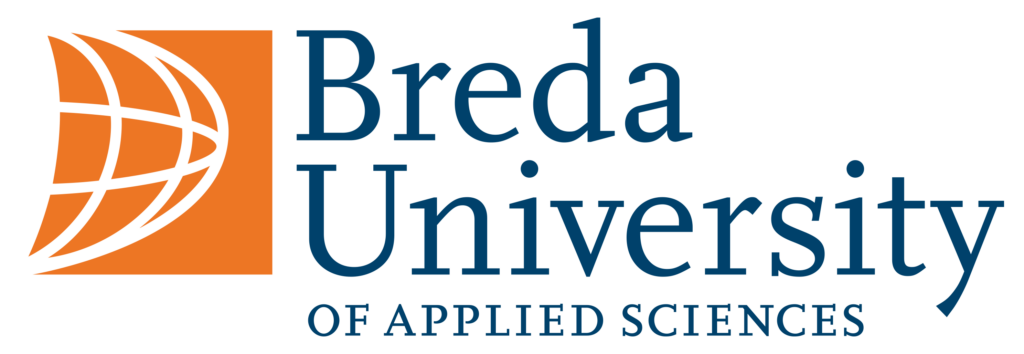
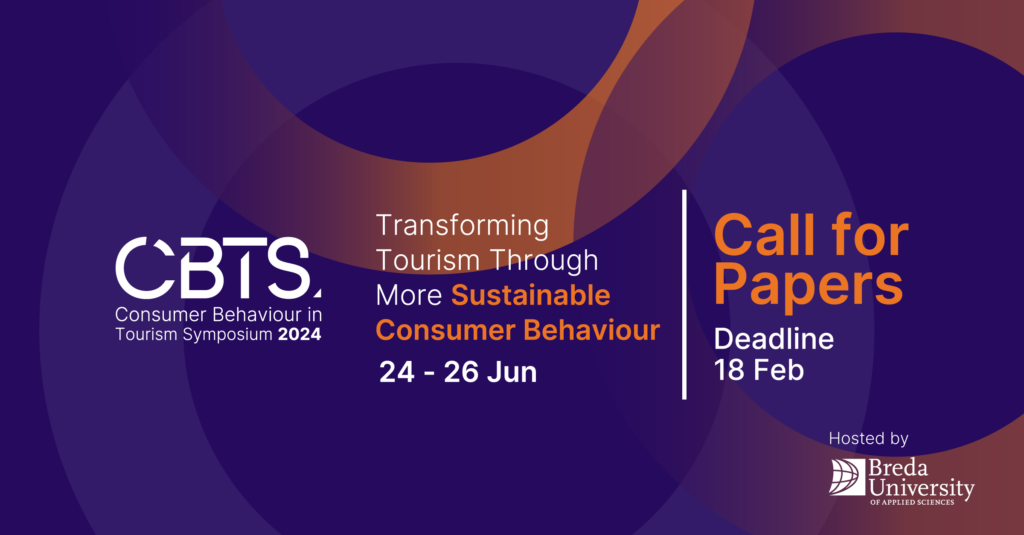
Introduction
Leisure & Tourism 2030: Navigating the Future
The United Nations World Tourism Organization (UNWTO) has adopted the 2030 Agenda for Sustainable Development. The agenda sets out a global framework to end poverty, fight inequality and injustice, and fix climate change by 2030. The UNWTO has also defined a clear and consistent sector-wide message and approach to climate action in the coming decade, aligned with the wider scientific framework and urgency to act now. In the light of this agenda, it is essential to stay ahead of the curve to succeed. The ATLAS Annual Conference 2024 “Leisure & Tourism 2030: Navigating the Future” aims to bring together researchers, educators and innovators to explore the future of leisure and tourism, and how we can adapt to meet the changing landscape. The conference will cover topics such as the impact of technology on travel, the rise of sustainability in leisure and tourism, societal impacts, and the changing preferences of consumers. We’ll also focus on emerging trends and opportunities, such as the growing interest in (designing) experiences and the rise of niche markets. Through engaging keynote speeches, parallel sessions, interactive panels, and networking opportunities, participants will gain valuable insights into the future of leisure and tourism, and how they can prepare for the challenges and opportunities ahead.
- Gössling, S., Scott, D., & Hall, C. M. (2020). Tourism and water: Interactions, impacts and challenges. Channel View Publications.
- UNWTO. (2018, 2019). Tourism Highlights 2018, 2019 Edition. UNWTO.
- Buhalis, D., & Sinarta, Y. M. (2020). Real-time co-creation and nowness service: lessons from tourism and hospitality. Journal of Travel Research, 0047287520964397.
- Streimikiene, D., Svagzdiene, B., Jasinskas, E., & Simanavicius, A. (2021). Sustainable tourism development and competitiveness: The systematic literature review. Sustainable development, 29(1), 259-271.
- Zhang, J., Gao, J., Li, X., & Song, H. (2020). Exploring the tourism destination image and brand personality relationship: a study of Zhangjiajie National Forest Park, China. Journal of Destination Marketing & Management, 17, 100429.
- Higham, J. E., & Hinch, T. (2018). Tourism and planetary health: A call for action. Journal of Travel Research, 0047287518771470.
- UNWTO. (2021). UNWTO Tourism Towards 2030, Global Report on Future Tourism. UNWTO.
- Sigala, M., Christou, E., & Gretzel, U. (2021). Advances in Tourism Marketing and Management: Future Tourism and Hospitality Industry: Challenges and Opportunities. Routledge.
Keynote speakers
Iis Tussyadiah
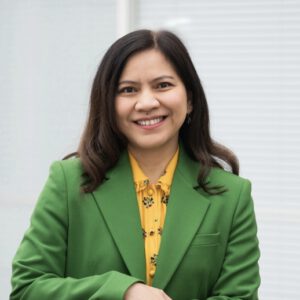
Iis Tussyadiah is Professor of Intelligent Systems in Service, Head of School of Hospitality and Tourism Management (SHTM), and Fellow of the Surrey Institute for People-Centred Artificial Intelligence (PAI Institute) at University of Surrey. Iis conducts research on digital transformation in the services sector, focusing on human-computer interaction, consumer behaviour, and management. Her current work covers human-AI teaming and the future of work and digital nudging for responsible behaviour.
Bernadette Quinn
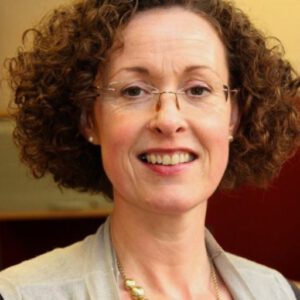
Bernadette Quinn, PhD, is a Human Geographer and Senior Lecturer in the Faculty of Arts & Humanities, Technological University Dublin, Ireland. She studies arts festivals and cultural events, being interested in the roles that they play in transforming space, reproducing place and shaping identities. Her work is widely published in international tourism, urban studies and geography journals and edited collections. Bernadette has held External Examining roles at a number of third level institutions in Europe and further afield. She sits on the Editorial Advisory Board of the Journal of Policy Research in Tourism, Leisure and Events and the Journal of Heritage Tourism and is a member of the International Geographical Union Tourism Commission board.
Frank Radstake
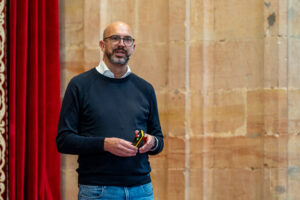
Frank Radstake works at the ANVR, the Dutch trade association of tour operators and travel agents. Within the organization he is responsible for, among other things, legal and consumer affairs, social policy, innovation and sustainability. He is currently working with CELTH and BUAS on a concrete action plan for the travel sector, in order to fulfill the far-reaching ambitions in the field of sustainability that the ANVR and the travel industry have. Radstake lives with his children in the center of the Netherlands. He really loves to come to Brabant, the Southern Dutch province, to visit BUAS in Breda or even better the Philips Stadium in Eindhoven, the home base of his favourite football team PSV.
Jos Vranken
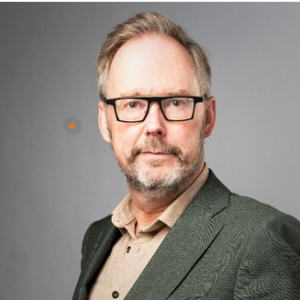
Jos is the Managing Director of NBTC (Nederlands Bureau voor Toerisme & Congressen), in the Netherlands, holding the overall responsibility for the national destination management organisation. In this role, he oversees the development, branding, and marketing of the Destination ‘Netherlands’ in 7 (inter)national core markets. In addition to his executive responsibilities, he contributes to the academic community as a guest lecturer and public speaker.
Greg Richards
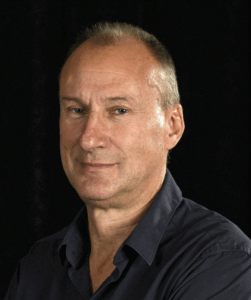
Greg Richards is Professor of Placemaking and Events at Breda University of Applied Sciences and Professor of Leisure Studies at Tilburg University in the Netherlands. He is also participating in EU research on cultural and creative tourism in rural and remote areas (CROCUS Project).
Moniek Hover
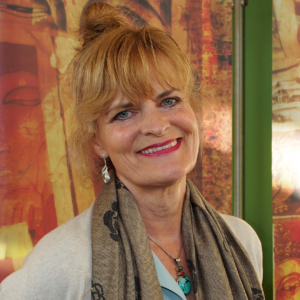
Dr. Moniek Hover is Professor of Storytelling at Breda University of Applied Sciences (the Netherlands), where she teaches in the field of leisure and tourism. Moniek received her PhD degree from Tilburg University in 2013 for the intrinsic case study of “The Efteling as a ‘Narrator‘ of Fairy Tales”. Efteling (founded in 1952) is the third largest theme park in Europe and part of the Dutch cultural heritage. Moniek does research into the connections between storytelling and experiences (emotions, memories and meaning) in the contexts of leisure, tourism and cultural heritage sites. She delivers presentations at academic and industry conferences, and she publishes in academic and industry journals.
With interdisciplinary BUas teams, Moniek provides (storytelling-based) research and design projects in the field of leisure and tourism. This entails story-based concepts, storylines, and interactive digital applications e.g. for (the redesign of) Van Gogh locations in Brabant (the Netherlands), Markiezenhof museum, Hanseatic Cities Marketing, Groote Heide Nature Park, Libema Zoos, World War II heritage sites. In line with this she also develops brand guides, books, scripts, dialogues, scenarios, and transmedia storytelling approaches.
Moniek and her team are currently involved in the development (with VisitBrabant) of cycling routes enriched with storytelling, based on e.g. legends and folktales, and industrial heritage. Another high-profile project is the creation of a mobile booth in which visitors can have interactive dialogues with characters from the past. A current research project entails narrative immersion in European theme parks.
Moniek develops and delivers workshops and training programs for the theme park industry (e.g. IAAPA EMEA), for marketing organizations, for the cultural heritage field, and for entrepreneurs around hiking/cycling routes.
Perry Hobson
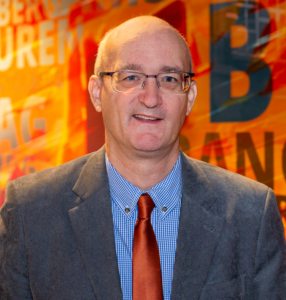
Perry Hobson is the Director/Dean of the Academy of Tourism at Breda University of Applied Sciences (BUas) in The Netherlands. He holds a Bachelor’s degree from the UK, a Masters from the USA, and completed his PhD in Australia. He has held academic and senior management positions in the USA, Hong Kong (SAR-China), Australia and Malaysia – along with being the founding Managing Director/CEO of the International Centre of Excellence in Hospitality & Tourism Education (THE-ICE) accreditation body. For his various contributions to education and research, he has been made an Honorary Fellow of CHME in the UK, CAUTHE in Australia and also by THE-ICE. Last year, he was recognized by iCHRIE with being awarded the Stevenson Fletcher Achievement Award in the USA. After serving as the Editor of the Journal of Vacation Marketing (JVM) for over 23-years, he is now the Editor Emeritus.
Conference Themes
The main theme of the conference is:
Leisure & Tourism 2030: Navigating the Future
We welcome abstracts in the following areas:
- Sustainability in Leisure & Tourism: How to Build a Greener Future – exploring practical ways to incorporate sustainable practices into leisure and tourism, such as reducing waste, conserving energy, and preserving natural resources.
- The Future of Technology in Leisure & Tourism: Innovations and Opportunities – focusing on emerging technologies that are changing the industry, such as virtual and augmented reality, blockchain, and AI. How can these technologies be applied in leisure and tourism and how they will shape the future.
- Adapting to Changing Consumer Preferences – exploring how traveler preferences in leisure and tourism are changing in the post-pandemic era, such as increased interest in off-the-beaten-path destinations, local experiences, events, and outdoor activities. How can businesses adapt to meet these changing preferences.
- Designing Memorable Experiences – focusing on the importance of creating unique and memorable experiences for consumers, such as immersive cultural experiences, adventure tourism, and events. How to design and market these experiences to attract and retain consumers.
- Tourism and Workforce Skills Development – examining the role of leisure and tourism in creating job opportunities, and the importance of providing training and career advancement opportunities for leisure and tourism workers. Exploring ways to promote fair and equitable working conditions in the industry.
- Placemaking and Destination Branding – focusing on how destinations can use placemaking and branding strategies to create a unique identity that attracts visitors while maintaining the character and authenticity of the destination. Exploring ways to involve residents in the process of destination branding and placemaking.
- Leisure and tourism growth and local livability – focusing on the challenges and opportunities of balancing leisure and tourism growth with local livelihoods in destinations. As tourism continues to grow, it can bring significant economic benefits to destinations, but it can also have negative social impacts on local communities, such as overcrowding, increased living costs, and displacement of local residents.
ATLAS – CBTS PhD Seminar
Sustainability transformations in leisure and tourism
Breda, The Netherlands
Tuesday June 25, 2024
More details HERE
Abstract submission for the PhD seminar before March 8th, 2024
CBTS – ATLAS Industry Day powered by CELTH
Sustainability Transformations in Tourism & Leisure
Breda, The Netherlands
Wednesday June 26, 2024
More details HERE
Research cafe: Storytelling and Narratives in Tourism and Leisure
By: Ilja Simons & Moniek Hover – Breda Univerity of Apllied Sciences
In this informal and interactive session, we would like to invite researchers to discuss the uses of storytelling, stories and narratives in tourism and leisure practice and research. Stories and narratives play an important role in sensemaking, identity construction and communication. In tourism and leisure contexts, storytelling is used in destination branding, placemaking, and as a tool for creating experiences. Moreover, from a social science perspective, stories and narratives play a role in meaning making, analysing social constructions and research methods.
This session aims to connect tourism and leisure scholars with an interest in stories and narratives from different perspectives. It will take the form of a research cafe in which we want to get to know each other and discuss the value of stories and narratives for tourism and leisure research and practice.
Depending on the outcomes of the session, we will develop further initiatives around this theme.
Call for Special Tracks
The conference organizers invite proposals for organizing special tracks during the conference and encourage ATLAS Special Interest Groups and Chapters to plan meetings and workshops within or alongside the conference programme. Please contact admin@atlas-euro.org before December 15th 2023 if you have any plans to organize a SIG meeting, a project meeting or a special track during this conference.
All 18 Special Tracks submitted for this conferencecan be found HERE
Abstract Submission
All abstracts will be subject to double-blind review by members of the scientific committee. Acceptance of a submission will be based on: theoretical and empirical significance; methodological soundness; relevance to the theme of the conference and logical clarity. The official language of the conference is English. Abstracts should have between max. 500 words. The title should be no more than 12 words. Authors should also indicate which conference topic their proposed paper relates to.
Abstracts should be submitted to ATLAS by using this form.
Publication Details
All abstracts (max 500 words) will be published in the Abstract Book.
All extended abstract/working papers (max 2000 words) will be published in the Book of Extended Abstracts (with ISBN) before the conference.
Both books will be sent to all registered participants before the conference, in PDF format, and will not be printed.
Delegates are welcome to submit their full papers (max 5000 words) before September 10th 2024. The Scientific Committee are considering the following ways to publish the papers. The possibilities are:
- Special issue in a journal – This will depend on the number, themes and quality of papers received.
- ATLAS Tourism and Leisure Review – The ATLAS Review gives ATLAS members and participants of the ATLAS conferences and meetings a platform to publish the papers they have presented. The editing will be carried out by an editorial board / field editors.
- The organisers of the different Special Tracks will actively seek for publication opportunities with high-impact journals or book publishers.
- Authors are also free to explore other possibilities for publishing their papers.
Please submit your paper in WORD format, formatted as plain and simple as possible to admin@atlas-euro.org.
Scientific Committee
International Scientific Committee
Corne Dijkmans – Breda University of Applied Sciences, the Netherlands
Ilja Simons – Breda University of Applied Sciences, the Netherlands
Tara Duncan – Dalarna University, Sweden
Melanie Smith – Budapest Metropolitan University, Hungary
Paolo Russo – University Rovira i Virgili, Spain
Perry Hobson – Breda University of Applied Sciences, the Netherlands
Marcel Bastiaansen – Breda University of Applied Sciences, the Netherlands
Esther Peperkamp – Breda University of Applied Sciences, the Netherlands
Bertine Bargeman – Breda University of Applied Sciences, the Netherlands
Willem Coetzee – University of Otago, New Zealand
Chin-Ee Ong – Macao Institute for Tourism Studies (IFTM), China
Daniel Barrera Fernandez – University of Seville, Spain
Miju Choi – Leeds Beckett University, UK
Jane Turner – Leeds Beckett University, UK
Karen Harris – University of Pretoria, South Africa
Jessika Weber – Breda University of Applied Sciences, the Netherlands
Nina Nesterova – Breda University of Applied Sciences, the Netherlands
Jeroen Klijs – Breda University of Applied Sciences, the Netherlands
Anna Carr – University of Otago, New Zealand
Joseph Cheer – Western Sydney University, Australia
Special Track Committee
Lucia Tomassini – NHL Stenden University, the Netherlands
Akke Folmer – NHL Stenden University, the Netherlands
Elena Cavagnaro – NHL Stenden University, the Netherlands
Kiran Shinde – La Trobe University, Australia
Daniel H. Olsen – Brigham Young University, USA
Moji Shahvali – Breda University of Applied Sciences, the Netherlands
Tila Pronk – Tilburg University, the Netherlands
Esther Peperkamp – Breda University of Applied Sciences, the Netherlands
Licia Calvi – Breda University of Applied Sciences, the Netherlands
Marisa de Brito – Breda University of Applied Sciences, the Netherlands
Ilja Simons – Breda University of Applied Sciences, the Netherlands
Elisa Burrai – Leeds Beckett University, UK
Davide Sterchele – Leeds Beckett University, UK
Miju Choi – Leeds Beckett University, UK
Puspita A. Permatasari-Grochowina – Breda University of Applied Sciences, the Netherlands
Tomas Mainil – Breda University of Applied Sciences, the Netherlands
Greg Richards – Breda University of Applied Sciences, the Netherlands
Maria del Pilar Leal – CETT Barcelona, Spain
Jordi Arcos-Pumarola – CETT Barcelona, Spain
Jessika Weber Sabil – Breda University of Applied Sciences, the Netherlands
Lénia Marques – Erasmus University Rotterdam, the Netherlands
Ioanna Farsari – Dalarna University, Sweden
Wilbert den Hoed – Rovira i Virgili University, Spain
Antonio Paolo Russo – Rovira i Virgili University, Spain
Licia Calvi – Breda University of Applied Sciences, the Netherlands
Rana Habib – Breda University of Applied Sciences, the Netherlands
Ko Koens – Breda University of Applied Sciences, the Netherlands
Marcel Bastiaansen – Breda University of Applied Sciences, the Netherlands
Ondrej Mitas – Breda University of Applied Sciences, the Netherlands
Rose Mcbean – Breda University of Applied Sciences, the Netherlands
Lobke Elbers – Breda University of Applied Sciences, the Netherlands
Chin-Ee Ong – Macao Institute for Tourism Studies (IFTM), China
Sharif Shams Imon – Macao Institute for Tourism Studies (IFTM), China
Konstantina Zerva – University of Girona, Spain
Kyriaki Glyptou – Leeds Beckett University, UK
Rodolfo Baggio – Bocconi University, Italy
Important Dates
| Abstract submission | January 15th 2024 |
| Abstract submission extension | February 9th 2024 |
| Notification of acceptance | February 15th 2024 |
| Notification of acceptance extension | March 9th 2024 |
| Extended abstract submission | March 15th 2024 |
| Conference | June 25-28th 2024 |
| Full paper submission | September 10th 2024 |
Program and Cooperation CBTS and ATLAS
Both the ATLAS as the CBTS conference will take place at BUAS in the week of 24-28 June 2024.
CBTS – Monday 24 to Wednesday 26 June 2024
ATLAS – Tuesday 25 to Friday 28 June 2024
There will be overlap in a few program components. Here an overview of both programs, with overlap in ORANGE
Fee structure
Both the ATLAS as well as the CBTS conference will take place at BUAS in the week of 24-28 June 2024. Therefore we are offering delegates a discount in case they would like to join both events.
The CBTS2024 website can be found HERE. The registration for the CBTS conference will also be carried out by ATLAS.
Conference fee |
Conference fee |
Discounted and combined conference fee | |
| Full fee ATLAS members | 355 | 425 | 695 |
| Full fee NON members | 355 | 520 | 785 |
| Student fee ATLAS members | 255 | 270 | 470 |
| Student fee NON members | 255 | 320 | 515 |
| CBTS conference dinner Tuesday | 65 | 65 | |
ATLAS conference dinner Thursday | 65 | 65 |
The full fee includes:
- Coffee breaks
- Lunches
- Receptions
- Conference dinner (optional for students)
- Conference materials
The fee for students includes:
- Coffee breaks
- Lunches
- Receptions
- Conference materials
Cancellation Policy
If written cancellation is received before June 1st 2024 a refund of all meeting fees will be made, minus an administration fee of € 50. No refund will be possible after June 1st 2024, but substitute delegates can be nominated.
Conference Venue

Situated in the South of the Netherlands, in the city of Breda, Breda University of Applied Sciences (called “BUAS” hereinafter) is a premier higher education institution with about 7,500 students from over 60 countries. The University was founded in 1966 as an institute offering management programmes in tourism and leisure and conducting research in this field.
BUAS’s unique approach and teaching and research outlook, proactively combined with an effective international classroom experience has gone a long way in developing an ideal learning environment for its students. BUAS offers 17 bachelor & 12 master’s Programmes in a wide variety of disciplines: Hospitality, Tourism & Leisure, Gaming, Logistics, and Media.
Since its inception, the institute has received several notable awards for its excellence in teaching and innovative programmes. Almost all of BUAS’s Bachelor Programmes were awarded with the highests ranks in the Dutch National Student Survey. The institute has received international accreditations from the UN World Tourism Organization (UNWTO/TedQual), the World Leisure Organization, and The International Facility Management Association. BUas has been consistently ranked amongst the Top 30 Global Institutions in the QS Subject Rankings for Hospitality & Leisure around the world.
BUAS collaborates with a wide variety of partners. In the Netherlands we are one of the three core members of CELTH, the national Centre of Expertise in the sector of leisure, tourism, and hospitality. The Dutch government engages with this center to identify trends and developments in the hospitality and tourism sectors and initiates cooperation between industry and education. BUas is accredited by the THE-ICE which is the International Centre of Excellence in Hospitality & Tourism Education (see https://the-ice.org), which has members in Switzerland, France, Australia, The Philippines, UAE, Qatar, Taiwan and Fiji amongst other countries. Our programmes are also certified by the United National World Tourism Organization’s (UNWTO) though its TedQual process. In addition to also being an Affiliate member of UNWTO, we are also a member of the Pacific Asia Travel Association (PATA).
Our innovations are award-winning on a global level, such as the development of the Carmacal Carbon Calculator, which was recognized with a WTTC Award in 2016, and a UNWTO Award in 2018. We also offer executive education and masterclasses to large and small organizations in tour guiding, sustainable tourism and ecotourism, digital tourism, social impacts of tourism and other areas.
BUAS has experience in organizing international conferences and is equipped with all the amenities and infrastructure required to host an event of this size.
BUAS offers its students plenty of opportunities to pursue their dreams in a small-scale and international study environment. Between 2016 and 2020, the campus along the Mgr. Hopmansstraat was fully redesigned and renovated, as well as expanded by the acquisition of the adjacent monastery. This former monastery is now the base of the Academy of Tourism. We think the delegates will be really impressed with the building and its facilities.
The campus itself is modern and spacious, with a range of facilities that are designed to meet the needs of visitors and students. The classrooms are equipped with the latest technology, and there are plenty of spaces for workers and students to work individually or in groups. The library is well-stocked and offers a quiet and peaceful space for students to work, while the various cafeterias and restaurants provide a range of delicious and healthy food options.
Location

Breda University of Applied Sciences
Mgr. Hopmansstraat 2
4817 JS Breda
The Netherlands
+31-76-533 22 03
https://www.buas.nl/en/contact-and-locations
Breda
BUAS is located in the city of Breda, a beautiful city located in the southern part of the Netherlands, known for its rich history, vibrant culture, and scenic beauty. Breda has many benefits, including:
- Excellent location: Breda is located at the crossroads of major European cities such as Amsterdam, Rotterdam, and Brussels. This makes it an ideal place to live for those who like to travel and explore new places.
- Rich history: Breda has a long and fascinating history dating back to the 12th century. It was once the home of the Dutch royal family and is still filled with historic landmarks and beautiful architecture.
- Cultural hub: Breda is a thriving cultural hub with numerous museums, art galleries, theaters, and music venues. There are always events and festivals happening in the city, providing residents with endless entertainment options.
- Scenic beauty: Breda is situated in a beautiful natural setting, surrounded by lush forests and picturesque countryside. The city also has many parks and green spaces, making it a great place to enjoy the outdoors.
- High quality of life: Breda consistently ranks as one of the best places to live in the Netherlands. The city has excellent schools, healthcare facilities, and public transportation. It also has a low crime rate, making it a safe and secure place to stay.
Overall, Breda is a wonderful city with many benefits for visitors and residents. Its location, history, culture, natural beauty, and high quality of life make it an ideal place to work, live and visit.
Recommended Hotels
Premier Classe Breda
44 minutes walk from BUAS
From € 54
https://breda.premiereclasse.com/en-us/
Teaching Hotel De Rooi Pannen
32 minutes walk from BUAS
From € 69
https://gastvrijderooipannenbreda.nl/slapen/en/
Hotel Campanile
44 minutes walk from BUAS or 26 minutes by bus
From € 74
https://breda.campanile.com/en-us/
Boutique hotel het Scheepshuys
12 minutes walk from BUAS
From € 140
https://hetscheepshuys.nl/?lang=en
GR8 Hotel
80 minutes walk from BUAS or 29 minutes by bus
From € 99
https://www.gr8hotels.nl/en/
Bastion Hotel Breda
80 minutes walk from BUAS or 29 minutes by bus
From € 73
https://www.bastionhotels.com/en-gb/hotels/hotel-breda?utm_campaign=gmb-B30&utm_medium=organic&utm_source=bing
Leonardo Hotel
20 minutes walk from BUAS
From €170
https://www.leonardo-hotels.com/breda/leonardo-hotel-breda-city-center
Golden Tulip Keyser
22 minutes walk from BUAS
From € 133
https://www.hotel-keyser.nl/en
Hotel Botanique Breda
22 minutes walk from BUAS
From € 154
https://hotel-botanique.nl/en/
Hotel Nassau
24 minutes walk from BUAS
From € 206
https://www.marriott.com/en-us/hotels/glzak-hotel-nassau-breda-autograph-collection/overview/
Transport
Breda is easily reachable with different modalities of transport.
Train
Breda train station is connected by NS Dutch trains, including trains to/from Belgium. EuroStar Trains (to/from the UK) arrive/depart from either Rotterdam or Brussels – with a direct local connection (30 minutes from Rotterdam or 90 minutes from Brussels).
Airports
There are four airports close to Breda – Amsterdam Schiphol Airport (60 minutes, direct train), Brussels National BRU (90 minutes, direct train), Rotterdam (50 minutes, bus connecting to train) and Eindhoven (about 75 minutes, bus connecting to train).
How to get to BUas
Breda University of Applied Sciences is located about a 15-minute walk from Breda central railway station; alternatively, you can take several buses.
Registration
- Contact
- Please contact: e-mail admin@atlas-euro.org
- Registration
- Submit this form to register for the conference
- Abstract submission form
- Submit this form to submit an abstract for the conference
